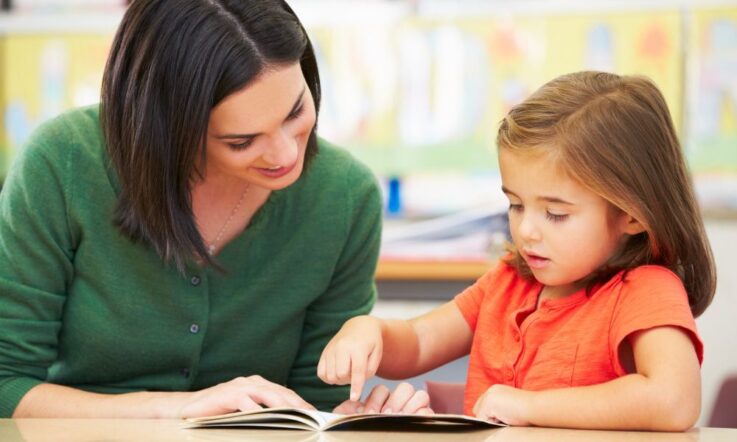This podcast from Teacher is supported by MacKillop Seasons, whose Seasons for Life project supports schools with loss and grief following a suicide and other loss event.
Thanks for downloading this podcast from Teacher – I’m Jo Earp. Welcome to Episode 85 of The Research Files. I’m delighted to say that my guest today is Professor Anne Castles, Australian Research Council Laureate Professor at the Australian Centre for the Advancement of Literacy at the Australian Catholic University. She’s a Keynote speaker at ACER’s Research Conference next month in Sydney. The conference theme is ‘Becoming lifelong learners’ and presenters will be examining research around how to improve continuity of learning in the first 12 years of a child’s life. The title of Professor Castles’ keynote is ‘Ensuring a safety net: Supporting low achievers in school contexts’. In our podcast chat we’ll be finding out more about her work, discussing some of the research on learning to read, and getting a taster of what delegates can expect from that Research Conference Keynote. So, let’s get started.
Jo Earp: Professor Anne Castles, welcome to The Research Files. So, throughout your career, then, your research has always focused on learning to read and reading disorders. Was that something you always wanted to explore? I'm interested in what drew you to that topic, to that field of research to start with.
Anne Castles: Yes, it's a very interesting question, and an interesting story actually, because I was doing Psychology for my undergraduate degree and as part of my Honours project, I did a project for year 1 students. And it was nothing to do with reading, I think it was actually looking at children's memory, but I remember going into this year 1 classroom and being absolutely just gobsmacked at the range of reading abilities that were represented there. So, you know, some of the kids in their spare time were, you know, picking up Harry Potter books or whatever was the equivalent at time.
There were other kids who barely knew their letters. And yet all of these kids were lovely, you know, good language, no evident problems. And I became fascinated with, why? Where does that variability come from, and why do some children pick this skill up so easily, whereas other children struggle so much? So, I guess that's really where it came from.
JE: Yeah, you mentioned there about the struggles. So, reading is an area of research that really attracts a lot of debate. And I've heard you describe the work that you do in really simple terms, which is clever, as really just trying to untangle how children learn to read and what it is that gets in their way. And then the different ways that different children can struggle with this. Why is the whole idea of learning to read, reading instruction, is such a controversial area in the research then?
AC: Look, I think the first answer to that is that, particularly in primary school, reading is just so prominent. You know, if a child is struggling with reading then, you know, it's very evident, it gets in the way of all the other things that they might be doing in the classroom. And, as a result of that, both parents and teachers are very, very focused on literacy. And the fact is all children are different. Some have wonderful skills in maths but might find it more difficult to learn to read. Others are completely the opposite. But I think literacy gets a focus because of the fact it's seen as so important to success in accessing the curriculum and then, down the track, in all aspects of your life. I mean, if you can't read well that limits you so much. And I think parents become terribly concerned if they think their child is falling behind in something that's so important.
And I guess the second answer to your question is, you know, there is this term ‘The Reading Wars’ that is applied to debates about reading, and it essentially reflects a division that is also true in many other disciplines. But basically, 2 views – one of which basically assumes that reading is kind of like learning to speak and will come fairly naturally, and as long as you expose children to rich texts and read to them, they will learn to read themselves. And then the other camp is sort of of the view that, you know, reading is not like learning to speak. We're not born with a, you know, a gene for reading. It's a complex, learned skill, and children need to be taught. And certainly, some children learn really easily, other children need more help. But, you know, we're going to get the best outcomes if schools provide some explicit teaching in those very early stages of learning to read, just to get everybody, every child a leg up to be able to read independently for themselves.
JE: Just going back to that thing you were saying about the importance of reading and the importance that it has in the curriculum. Obviously, it opens doors doesn’t it for other things. Like you were saying, you can be great at maths, and I remember you knows as a former primary teacher myself, you do, you have these students who are really good at maths, not so good at reading. Of course, that’s fine, until you get to the word problems and the comprehension of that, and just the access to the rest of the curriculum, isn't it?
AC: Exactly. And one of the things that we're paying a lot of attention to now in our research group is, as children get older and they're struggling with reading, and they know they're struggling with reading – kids aren't stupid they can very quickly tell who's the good reader and who's the not good reader in the class – and if they classify themselves in that ‘not good reader’ category it has, you know, significant effects on self-esteem and academic self-concept. But a lot of the ways that we might intervene to assist children with that aspect of things, perhaps their anxiety around reading, involves a lot of written text. So, we've got this problem that we really need to, if there are children that are struggling, we need to think about the whole child and think about making sure that they're given access to interventions that are suitable to them.
JE: That's it, yeah. So, you mentioned there some of the work that you are doing. You recently started in the role as Laureate Professor at the Australian Centre for the Advancement of Literacy at ACU. Can you tell me a little bit about that role, and then some of the things that you and the researchers at the centre are involved in and working on currently?
AC: Yes, it's very it's all very exciting actually. So, the Laureate program that I'm working in is funded by the Australian Research Council. So, it's actually a separate program that fits within the ACU centre that you refer to. And what we're hoping to tackle, it’s a 5-year study but what we're hoping to tackle is high school literacy. Which is a huge gap, because you know there is a little bit of this assumption, I think, that once children reach high school you don't worry about assessing or tracking their reading skill anymore; you get onto, you know, sort of the curriculum – whether that be reading Shakespeare or doing biology or other things. But we know from NAPLAN and also from international comparisons of reading across different countries, that I think the estimate is something like 40% of children in year 9 don't really have functional literacy. That's a very scary figure and it's very clear that there are children that are not getting access to the curriculum in the way they might want in high school because they've got basic difficulties in reading and that that is not being addressed because there's no facility at this stage for teachers or high schools to really do that.
So, we want to fix that. The first thing we want to do is develop really good, research-based assessments – like we have for primary school – to make sure that children, when they come into high school, there can be a check of how their reading is tracking (a very quick sort of screen), and that those that are flagged as having a difficulty, that then appropriate interventions are put in place. And we'll be working on trying to develop, do research to work out what form those interventions might take.
JE: Oh wow. That sounds fascinating and that sounds great, because I'm sure there's a lot of high school teachers out there listening now and nodding their heads to that, about some of the problems. And, you know, everything from – you just don't have the time, how do you how do you deal with that while you're trying to move the curriculum along?
AC: That's right.
JE: Also, resources in this area. You know, you can't put, you know, what I would call like a children's book in front of a high school students. There’s…yeah.
AC: And I do, I must admit, lose a little bit of sleep when I think about the enormity of it. But you're exactly right. I mean, and I have talked to many teachers and the fact is it's not in the job description of most high school teachers. Certainly not the English teachers. Most schools have a learning support teacher, and that person has hopefully some opportunity to assist here. But, you know, that's often a very limited role, and we're talking about a big problem and there's no training given about what to do with a struggling reader in high school.
JE: It is a big project you've got on your hands there. People will be waiting with bated breath; but yeah, we definitely will be interested in the results of that. And so, as I mentioned in the intro then, you're a keynote speaker at Research Conference 2023. Just to give listeners a bit about the conference theme itself – so, that looks at the challenge of…OK, we know that the early years are crucial in terms of building those strong foundations for obviously the academic side of things, but also cognitive and social emotional development. We also know that the first 12 years of a child's life, they'll be switching between different settings. So, you've got early childhood to primary and then primary to secondary. And so really the challenge is, you know, how can we make the most of that period of learning. Your keynote is titled ‘Ensuring a safety net: Supporting low achievers in school contexts.’ One aspect of that is identifying firstly those children who are struggling.
AC: Absolutely. And that's, I mean the focus in my talk will be predominantly primary school because my new project I haven't got too much to say yet, it's only just started. But one thing, as you say, is that we now do know, we know a lot about how children learn to read and how to teach them, and we now have really good, targeted evidence-based assessments that can be given to children so we can, you know, very reliably identify those who are struggling. And we also know what kinds of interventions are likely to work.
So, what I'm going to hope to do in the talk is to give the audience, particularly teachers, sort of a road map that they can use. It's a cognitive model, but it really is a road map that specifies all the key processes that we know are important in reading and that gives teachers information about how to assess each of those components without, you know, giving the kid 17 hours of testing. And we know that we can do that. And, so, what I want to do is sort of try to convince teachers that although it might look a little bit daunting at first, that having a clear framework of what a child needs to learn makes it much, much easier to think about assessment and to think about intervention. Because you can go ‘OK, I know this child's doing OK here, but they struggled a little bit here, so let's target in on that.’ And so, in that way, we're creating a safety net. If we make sure that we can kind of tick the boxes on every component of the road map for a child, we know that they will be in a good position to move into high school reading independently, which is of course what we want for all children.
We’ll be back with more from Professor Anne Castles after this quick message from our sponsor.
You’re listening to a podcast from Teacher magazine, supported by MacKillop Seasons, whose Seasons for Life project supports young people affected by suicide and other loss events throughout Australia. Free for Australian high schools and based on the strong evidence-base of the Seasons for Growth change, loss and grief education programs, the Seasons for Life project builds wellbeing, resilience, social and emotional coping skills, and strengthens supportive relationships.
JE: You mentioned the idea of too much testing, there, and I guess that's a trap you can fall into – not just for the children (as you mentioned) that maybe are struggling, you don't want to put them through this massive series of tests, but also with the children that are on track as well. You don't want it to be too onerous for everybody, really.
AC: Exactly, exactly. And you certainly don't want to be overtesting kids that are doing completely fine; and that will be a significant proportion of the children in most classrooms, will be fine. So that's exactly what we've tried to do. We've tried to come up with something where you've got some fairly quick and basic initial screens which will cover most of the bases, and if a child performs well on that screen tick, tick them off, don't need to worry about them anymore. If a child doesn't perform well on that broad initial screen, then we need to dig down a little bit further with a little bit more testing and, you know, following up that child in a little bit more detail.
What I hope is that I can provide teachers with a way of, you know, sifting out the ones who are struggling, not missing anybody, and feeling confident that all the other children are doing fine. So that it will give them a sense of confidence, which I think sometimes they don't have because there's this sense of ‘I'm being told all these different things about what a child should or shouldn't be doing and how to teach them to read and what to do and what not to do’ such that they feel quite unconfident about even saying, you know, ‘this child is struggling reader,’ ‘this child isn't’. So, I hope that I'll be able to reassure them all of the things that I'm talking about are the sorts of things that are done standardly in most classrooms, but to structure that in a way that makes it easier for teachers to be able to, you know, have a framework that they know they can feel confident to be able to use and to be able to identify the struggling readers.
JE: So, you mentioned you will be using in this cognitive model of reading as a guide then, as a ‘road map’, as you call it, for teachers. What do we mean by a cognitive model, then? And the other thing that's interesting is, do you think that, you know, models and frameworks, do you think teachers can find them a little bit intimidating at first? I guess this is where they need to support, do they, the training in how to use them?
AC: Yes, I think they can be a little bit intimidating at first and I want to assure attendees at my talk that I will be taking people through this very carefully and systematically. And really, to break down a cognitive model all we're really saying is when you or I, anybody, reads a word or looks at a word on a page there are a number of processes that happen. I mean … they’re straightforward; obviously you recognise the letters of the word. You might think that's simple and basic, but remember that letters come in uppercase and lowercase and running writing. And you have some sort of system in your brain that's able to go ‘OK, you know, that's the letter “L”’, regardless of what format it might be presented in on the page. So, this is more than just vision.
And then, you know, when you see a new word we automatically have the ability to get to the pronunciation of that word. So, you know, we're reading new words all the time. I'm wearing a little top today that is kind of short at the front and long at the back, and we were joking today that it was a cross between a cape and a poncho, so we were going to call it a ‘concho’. So, you know, the first time if I wrote this down to you and you saw the word ‘concho’ you can read it, because you have knowledge of how letters and sounds go together and also, you know, you have a whole rich system of understanding of what words mean and their grammatical structure – so all of those things are things that are part of reading.
Also, our ability to swiftly recognise words that are very familiar to us. So obviously if you see the word ‘cat’ you don't need to, as a skilled reader you don't need to sit there and sound it out because you've seen that word thousands of times before, but a child in kindergarten might need to sound it out. So, we need to know … have that model in mind. It’s the same model, regardless of whether you're 5 or 55, but we need to have norms to say ‘where would we expect a child to be on these different processes at any particular point in time’.
JE: So, actually, I'm going to come back to that point for the final question then. So, you’re taking conference delegates through this roadmap then, you’re discussing how they can use that for evidence-based evaluations as well (which are important) and not making that so onerous. And we've said, haven't we, there are secondary teachers out there who would thinking, you know ‘I've got kids in my class who are struggling with the early stages of reading.’ And it's interesting, we had a comment on an article – we did a phonics Q&A the other day and we had a comment on that article saying, you know, ‘do we know what works after grade 6? Because I've got problems with my class’. And you were saying then, so this model and this approach that you're going to go through, we can pick that up in secondary school, we can say ‘hey, I've got a student who's struggling’. You could still use this model with a higher age group?
AC: Absolutely. Because the model is of the processes that we know happen in our brain when we read. So, what we want to do is make sure a child is gradually acquiring all of those processes and at the right rate. What we need to do in high school, which we haven't done yet, but we will do as part of my Laureate project, is we need to collect normative data. So, we'd be using the same sorts of tests, but at the moment the norms we have only really go to the end of primary school. So, as I said, you know the norms might have a word like ‘cat’, which would be, you know, if it's a kindergarten child that struggled with that, we wouldn't worry. But if a year 6 child struggled with that, we'd worry quite a bit. And so, we need to extend the test to more difficult items, maybe longer, and words with morphological complexity – you know, the i/n/g’s and the o/u/s’s and things like that, and longer multisyllable words, so that we can sort of develop norms that are appropriate for children as they move through high school. But the model itself doesn't change, it's just at the level of functioning or the number of words that a child might recognise automatically, as opposed to having to read for the first time.
JE: That's great. Well, as I say, it's great to hear the work that you are doing at the centre now and it's been terrific catching up with you today. I'll be in Sydney next month for the conference – so that’s Sunday the 3rd, Monday the 4th of September at the ICC, you can head to researchconference.com.au for more information and to register. So, as I said, I'll be there. I'm very much looking forward to your keynote Anne, but for now, Professor Anne Castles, thanks very much for sharing your expertise with The Research Files.
AC: Thank you, it's been great to talk to you.
That’s all for this episode. If you want to keep listening, you can access more than 280 Teacher podcast episodes from our archive at teachermagazine.com, or wherever you get your podcasts from. Before you go, I have a quick favour to ask – please take a few moments to review our podcast; it helps other people like you to find it and it’s a big support to the Teacher team. Thanks.
You’ve been listening to a podcast from Teacher, supported by MacKillop Seasons, Seasons for Life – supporting schools and young people affected by suicide and other significant losses. Visit mackillopseasons.org.au.
Professor Anne Castles will be delivering a day 2 keynote at Research Conference 2023. Register now for the conference – at the ICC Sydney on September 3 and 4 – to increase your impact in progressing children’s learning from birth to 12 years.



